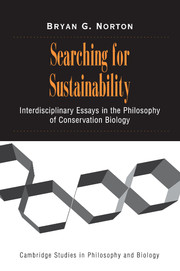Book contents
- Frontmatter
- Contents
- Searching for Sustainability
- General Introduction: An Interdisciplinary Experiment
- I PRAGMATISM AS AN ENVIRONMENTAL PHILOSOPHY
- II SCIENCE, POLICY, AND POLICY SCIENCE
- III ECONOMICS AND ENVIRONMENTAL SUSTAINABILITY
- IV SCALING SUSTAINABILITY: ECOLOGY AS IF HUMANS MATTERED
- V SOME ELEMENTS OF A PHILOSOPHY OF SUSTAINABLE LIVING
- VI VALUING SUSTAINABILITY: TOWARD A MORE COMPREHENSIVE APPROACH TO ENVIRONMENTAL EVALUATION
- Index
VI - VALUING SUSTAINABILITY: TOWARD A MORE COMPREHENSIVE APPROACH TO ENVIRONMENTAL EVALUATION
Published online by Cambridge University Press: 21 January 2010
- Frontmatter
- Contents
- Searching for Sustainability
- General Introduction: An Interdisciplinary Experiment
- I PRAGMATISM AS AN ENVIRONMENTAL PHILOSOPHY
- II SCIENCE, POLICY, AND POLICY SCIENCE
- III ECONOMICS AND ENVIRONMENTAL SUSTAINABILITY
- IV SCALING SUSTAINABILITY: ECOLOGY AS IF HUMANS MATTERED
- V SOME ELEMENTS OF A PHILOSOPHY OF SUSTAINABLE LIVING
- VI VALUING SUSTAINABILITY: TOWARD A MORE COMPREHENSIVE APPROACH TO ENVIRONMENTAL EVALUATION
- Index
Summary
So, what is the upshot of my multidisciplinary experiment? The shortest answer is that I learned that the idea of sustainability cannot be fully captured in the theories and concepts of any one of the diverse disciplines that contribute to environmental science. In particular, the idea cannot be captured by any science that is understood as an exemplar of objective, descriptive, and value-neutral science, whether natural or social. The understanding of science as value neutral, it is now agreed, is at best an abstraction – an ideal that is never achieved by any real science, much less by an openly normative and committed, mission-oriented science such as conservation biology, conservation ecology, or environmental management.
One central theme of these papers has been that the “serial” model of doing and gathering science – which begins by describing the changes and impacts of human actions and proceeds to evaluate outcomes only after scientific description is complete – is a pipe dream based on arbitrary and artificial disciplinary boundaries. The upshot of my experiment is that sustainability has an inevitable normative aspect, which cannot be fully appreciated unless it is contextualized within an action-oriented situation in which real people compete, conflict, and deliberate about what to do in response to real environmental problems. What we need is mission-oriented science, and the mission is to find creative, cooperative solutions to environmental problems.
- Type
- Chapter
- Information
- Searching for SustainabilityInterdisciplinary Essays in the Philosophy of Conservation Biology, pp. 457 - 459Publisher: Cambridge University PressPrint publication year: 2002



